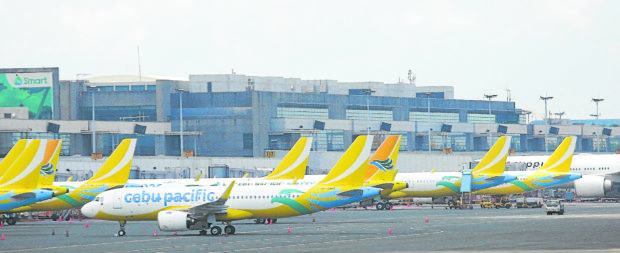Cebu Pacific cuts more jobs

IDLED PLANES These planes parked at Ninoy Aquino International Airport Terminal 3 are part of the 76-aircraft fleet of Cebu Pacific, the country’s biggest budget airline, which had been poised to fly its 200-millionth passenger this year. But now the airline is shedding more jobs to survive because of the coronavirus pandemic. —LYN RILLON
MANILA, Philippines — Cebu Pacific, the country’s biggest budget airline, is implementing a second wave of job cuts as it fights to survive the new coronavirus pandemic that is sweeping the globe.
An Inquirer source said the layoffs and voluntary separation could affect about 30 percent of the carrier’s 4,000 employees and would be implemented by early next month.
A Cebu Pacific spokesperson has confirmed the job cuts but said details had yet to be finalized.
“The rightsizing of Cebu Pacific will be necessary to fulfill our commitment to provide affordable, accessible, and available air travel and air transport services to every Juan in the years to come,” Charo Logarta Lagamon, Cebu Pacific director for communications, said in a statement to the Inquirer on Tuesday.
The company laid off an initial batch of 190 newly hired cabin crew members in March.
Article continues after this advertisementFlight attendants, pilots
The latest reductions will be across the board and include cabin crew, like flight attendants and pilots, the source said.
Article continues after this advertisementEmployees were told the manpower reduction would ensure the revival of Cebu Pacific, a pioneering budget carrier launched by the Gokongwei family in 1996 with a fleet of four McDonnell Douglas DC-9s.
Today, Cebu Pacific is the country’s biggest airline by domestic market share. It has 76 planes and was poised to serve its 200 millionth customer in 2020.
Those expansion goals—along with those of other carriers in the Philippines and around the world—have been scaled down or placed on hold as COVID-19 severely impacts demand for air travel.
PAL, AirAsia
The layoffs at Cebu Pacific will add to more than 2,150 aviation jobs lost or slated to be cut since February, such as the 300 workers at Philippine Airlines (PAL), 1,400 at 1Aviation Groundhandling Services Corp. and 260 at AirAsia Philippines.
Lagamon said Cebu Pacific was now undergoing a “transformation process,” with recovery in the industry not expected for another two to three years.
Apart from cutting costs and investments, the airline implemented a sweeping review of its long-term expansion, which includes the acquisition of 61 next-generation planes until 2026.
The new approach will ensure the long-term sustainability of the business, given the expected changes in travel demand and consumer behavior, according to Lagamon.
Slow recovery
“We expect travel recovery to happen over a longer period, with COVID-19 impacting the aviation industry,” she said.
The problems of the aviation sector are also linked to confusing government regulations and the lack of COVID-19 testing, according to industry officials.
Inconsistent guidelines of the national and local governments have marred local air travel after strict quarantine measures were lifted on June 1.
Airlines have since warned passengers that schedules can change day to day as local government units tighten restrictions.
Roberto Lim, vice chair of the Air Carriers Association of the Philippines, said in an earlier interview that the government would need to ramp up COVID-19 testing to allow the entry of more international travelers.
Among the domestic airlines, only PAL has restarted overseas travel, subject to limits set by the government.
Outside the Philippines, global carriers are also struggling as demand falls and countries relax and tighten lockdowns, while new COVID-19 hot spots emerge.
Bailout
Wealthy countries, such as the United States and Germany, have chosen to support their airlines with multibillion-dollar bailouts. Earlier this month, Hong Kong’s Cathay Pacific said it was receiving $5 billion in state-backed lifeline.
The Philippine government has yet to extend any similar support to local airlines or other key industries such as tourism. Job losses from these two crucial sectors could reach 548,300 for 2020 alone, according to the International Air Transport Association.
The various stimulus packages that would prop up important businesses such as airlines were not certified as urgent by Malacañang. Instead, President Duterte gave priority to a controversial antiterror measure that now awaits his signature.
Finance Secretary Carlos Dominguez III previously indicated that state-controlled lenders could be authorized to make investments “in companies critical to national interest that are now experiencing solvency problems.”